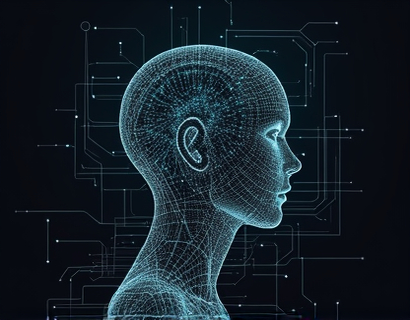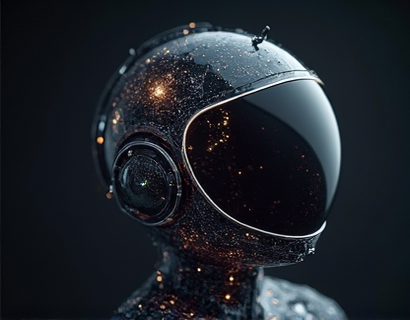Personalized AI Companions: Transforming Childhood Creativity and Emotional Well-Being Through Interactive Digital Friends
In recent years, the integration of artificial intelligence in children's play and development has opened new avenues for enhancing creativity and emotional well-being. AI-driven imaginary friends, often referred to as digital companions, are redefining the way young children interact with technology. These personalized digital entities are not just simple games or apps; they are sophisticated tools designed to foster imaginative play, support social skills, and provide a safe space for emotional exploration.
The concept of digital companions for children is rooted in the understanding that interactive and engaging experiences are crucial for cognitive and emotional development. Traditional toys and games have long been recognized for their role in childhood growth, but the addition of AI technology brings a new level of personalization and adaptability. These digital friends can learn from a child's interactions, adjusting their behavior and responses to suit the individual's needs and interests.
Personalization in AI Digital Companions
One of the key features of AI-driven imaginary friends is their ability to offer personalized experiences. Through machine learning algorithms, these companions can analyze a child's preferences, behaviors, and emotional states to tailor their interactions. For instance, if a child expresses a keen interest in dinosaurs, the digital friend can incorporate dinosaurs into conversations, stories, and activities. This level of customization ensures that the interactions remain engaging and relevant, encouraging children to spend more time in these digital environments.
Personalization extends beyond just content. The digital companions can adapt their communication style to match the child's age, language level, and emotional state. For younger children, the companion might use simpler language and more visual cues, while older children can engage in more complex conversations. This adaptability helps build a strong, trusting relationship between the child and the digital friend, which is essential for fostering emotional growth.
Fostering Creativity Through Interactive Play
Creativity is a fundamental aspect of childhood development, and AI digital companions provide a rich platform for creative expression. These companions can engage children in a variety of activities, from storytelling and drawing to problem-solving and role-playing. By participating in these activities, children are encouraged to think outside the box and explore new ideas.
Storytelling is a particularly powerful tool for creativity. AI digital companions can create interactive stories where children can influence the plot and characters. This not only enhances narrative skills but also allows children to experiment with different scenarios and outcomes. The companions can suggest plot twists, introduce new characters, and even change the setting, all based on the child's input. This dynamic process stimulates the imagination and helps children develop a deeper understanding of narrative structures.
Art and drawing are other areas where AI companions can spark creativity. Digital drawing tools integrated with the companions allow children to create artwork that can come to life. For example, a child might draw a picture of a magical forest, and the digital friend can bring that forest to life, complete with animated creatures and interactive elements. This blend of digital and creative arts provides a unique and engaging way for children to express themselves.
Supporting Emotional Well-Being
Emotional well-being is as important as cognitive development, and AI digital companions play a significant role in supporting this aspect of childhood growth. These companions can recognize and respond to a child's emotional state, offering comfort and guidance when needed. For instance, if a child is feeling sad or anxious, the digital friend can initiate a conversation to help the child process their feelings. The companion might suggest relaxation techniques, share calming stories, or engage in soothing activities together.
The ability to provide emotional support in a safe and non-judgmental space is invaluable. Children often feel more comfortable opening up to a digital friend than to a human, especially if they are dealing with sensitive issues. The companions can offer reassurance, validate feelings, and provide positive reinforcement, all of which contribute to building self-esteem and resilience.
Moreover, AI digital companions can help children develop emotional vocabulary and understanding. Through interactive games and conversations, children learn to identify and express their emotions more effectively. This skill is crucial for healthy social interactions and relationships in the future.
Safe and Nurturing Digital Spaces
One of the most significant advantages of AI digital companions is the safe and controlled environment they provide. Unlike the internet at large, which can expose children to inappropriate content and online predators, these digital friends operate within a carefully curated space. Parents and guardians can rest assured that their children are interacting with content that is age-appropriate and free from harmful influences.
The digital companions are designed with robust safety features, including strict data privacy policies and monitoring systems to ensure that interactions remain positive and beneficial. This safety aspect is particularly important for parents who are concerned about the digital footprint of their children but also want to allow them to explore and learn through technology.
Social Skills Development
Interacting with AI digital companions can also aid in the development of social skills. Through role-playing and scenario-based interactions, children can practice communication, empathy, and cooperation. For example, a digital companion might simulate a school setting where children can practice making friends, resolving conflicts, and participating in group activities. These simulations provide a risk-free environment to experiment with different social behaviors and receive immediate feedback.
Additionally, the companions can facilitate conversations about social situations and emotions, helping children understand the perspectives of others. This cognitive empathy is a critical component of social intelligence and is essential for forming and maintaining healthy relationships.
Enhancing Parent-Child Interaction
The presence of AI digital companions can also positively impact parent-child interactions. Parents can use these companions as tools to engage more deeply with their children, understanding their interests and emotional states better. The companions can provide insights and suggestions for activities that parents can do together, fostering a stronger bond and more meaningful conversations.
Moreover, the digital companions can serve as a bridge between the physical and digital worlds, helping parents navigate the challenges of raising children in a tech-savvy era. By understanding the benefits and proper use of AI companions, parents can guide their children in developing healthy digital habits and a balanced approach to technology.
Conclusion
AI-driven imaginary friends are more than just a novelty; they are powerful tools that can significantly enhance childhood creativity and emotional well-being. By offering personalized, interactive experiences, these digital companions support cognitive and emotional development in a safe and nurturing environment. As technology continues to evolve, the potential for AI to positively impact childhood development is vast, opening new possibilities for educational and emotional growth.











































